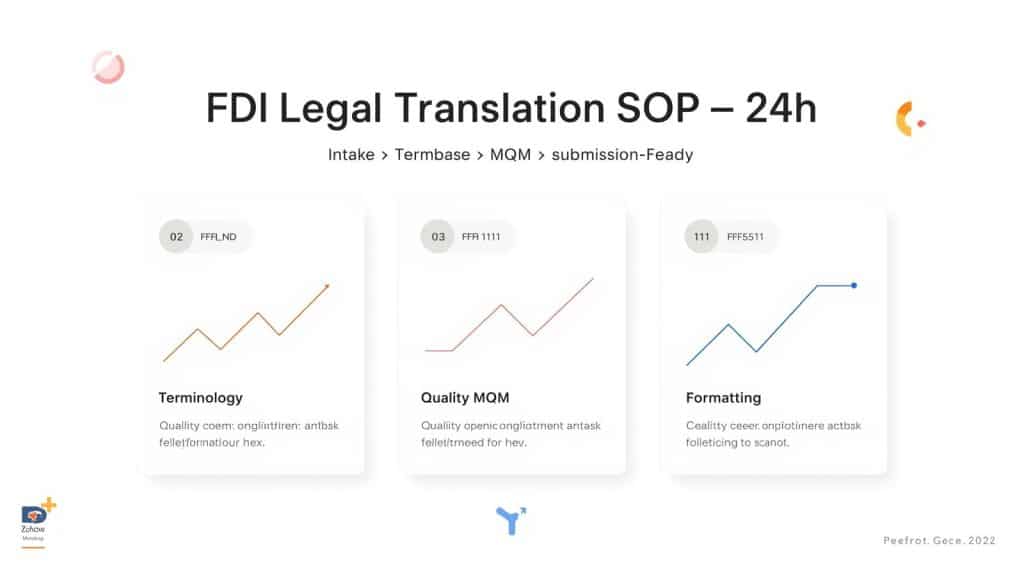FREQUENTLY ASKED QUESTIONS
24/7 support in every corner of Vietnam
DOCUMENT TRANSLATION
Professional document translation services offer several benefits, including accuracy, cultural sensitivity, and time-saving. They ensure that your documents are translated correctly and effectively, maintaining the intended meaning across languages.
Accurate document translation is crucial for international business communication as it helps establish trust and credibility with partners, clients, and stakeholders from different linguistic backgrounds. It can prevent misunderstandings and ensure that important information is conveyed clearly and effectively.
Resources such as online translation tools, professional translation services specializing in academic documents, and collaboration with bilingual peers or professors can assist in translating academic papers and dissertations accurately.
When translating legal documents, it’s essential to consider legal terminology, cultural nuances, and the specific legal requirements of the target country or jurisdiction to ensure accuracy and legality.
Precision in translating medical documents is paramount to ensure patient safety and effective communication among healthcare professionals. Misinterpretations or inaccuracies in medical translations can have serious consequences.
Best practices for translating official government documents involve adherence to language standards, cultural sensitivity, and collaboration with professional translators or translation agencies experienced in governmental terminology and protocols.
Document translation services can assist travelers by providing translated versions of essential documents such as passports, visas, medical records, and travel itineraries, helping them navigate language barriers more easily while abroad.
Tools like translation software, online platforms for finding translation gigs, and networking with other translators can help freelancers efficiently manage document translation projects and build their client base.
Effective document translation is crucial for global marketing campaigns to ensure that messaging resonates with target audiences in different regions, taking into account cultural differences and linguistic nuances.
Language learners can improve their translation skills by practicing with a variety of documents, using bilingual dictionaries and language learning apps, and seeking feedback from native speakers or language instructors.
Translated employee documents facilitate the onboarding process for multinational staff by ensuring that important information such as contracts, policies, and training materials is accessible and understandable to all employees.
Translated educational material promotes inclusivity and accessibility, allowing students from diverse linguistic backgrounds to engage with course content and resources effectively.
Advancements in machine translation technology, such as neural machine translation, are improving the accuracy and efficiency of document translation, making it faster and more accessible for users.
Translated documents play a crucial role in delivering humanitarian aid and support to diverse communities by ensuring that information about services, rights, and resources is accessible to all individuals, regardless of language.
Translated documentation enables journalists to report on global events and issues more accurately and comprehensively, reaching broader audiences and fostering cross-cultural understanding.
Translating property documents for international clients requires attention to detail and accuracy to ensure that terms and conditions are clearly understood and legally binding across languages.
Accurate translation of financial documents is essential for compliance with international regulations and standards, as well as for maintaining transparency and trust with clients and stakeholders.
Translating historical documents and manuscripts requires specialized knowledge of historical context, language, and cultural nuances to preserve the integrity and accuracy of the original texts.
Translators can specialize in specific document types by gaining expertise in relevant subject matter, terminology, and industry standards through training, experience, and ongoing professional development.
Translated product documentation, including user manuals, product descriptions, and customer support materials, enhances the customer experience and facilitates sales by providing information in the customer’s preferred language.
NOTARIZED TRANSLATION
To have a document notarized and translated, key components include the original document, a certified translator, and a notary public. The translator translates the content accurately, the notary public verifies the identities of the parties involved, and the accuracy of the translation before notarizing it.
The authenticity of a notarized translation document can be verified by checking the signature and seal of the notary public, ensuring it matches the official records of the notary.
The typical process involves submitting the original document to a certified translator, receiving the translated document, and then having both the original and translated versions notarized by a notary public.
Legal requirements for notarized translation documents vary by country, but generally involve adhering to the laws and regulations governing notaries and certified translators.
The time taken depends on factors such as the complexity of the document and the availability of translators and notaries, but it usually ranges from a few hours to a few days.
Documents such as birth certificates, marriage certificates, academic transcripts, and legal contracts commonly require notarized translations.
Yes, a notarized translation document can be used for official purposes internationally, provided it meets the legal requirements of the relevant countries.
The main difference is that a notarized translation has been certified by a notary public, while a certified translation has been verified by a translator or translation agency.
Costs vary depending on factors such as the length and complexity of the document, the language pair, and the service provider. Prices can range from a few to several hundred dollars.
Look for providers with experienced translators, positive reviews from past clients, clear pricing and turnaround time estimates, and adherence to legal and industry standards.
Formatting requirements may vary depending on the purpose of the document and the preferences of the requesting party, but generally, clear and legible formatting is necessary.
Notarized translation documents may be necessary for immigration applications, legal proceedings, academic admissions, and business transactions involving foreign parties.
Commonly offered languages for notarized translation services include English, Spanish, French, German, Chinese, and Arabic, among others.
To ensure confidentiality and security, choose reputable providers who have strict privacy policies, secure data transmission protocols, and procedures for securely storing and handling sensitive information.
Some providers offer expedited services for an additional fee, which can shorten the turnaround time to as little as 12-48 hours in urgent cases.
If errors or discrepancies are found in a notarized translation document, recourse options may include requesting corrections from the translator or notary, or seeking legal advice depending on the severity of the issue.
Notarized translation documents can be used in court proceedings as evidence or to fulfill legal requirements, provided they meet the criteria set forth by the relevant jurisdiction.
The role of a notary public in the translation process is to verify the identities of the parties involved, ensure the accuracy of the translation, and officially certify the document with their signature and seal.
Regulations and standards for notarized translation services may vary by jurisdiction, but they often include requirements for translators to be certified or accredited, and for notaries to follow specific procedures when notarizing documents.
The validity period of a notarized translation document for legal or official purposes depends on the specific requirements of the requesting party or jurisdiction, but they are typically considered valid indefinitely unless otherwise specified.






